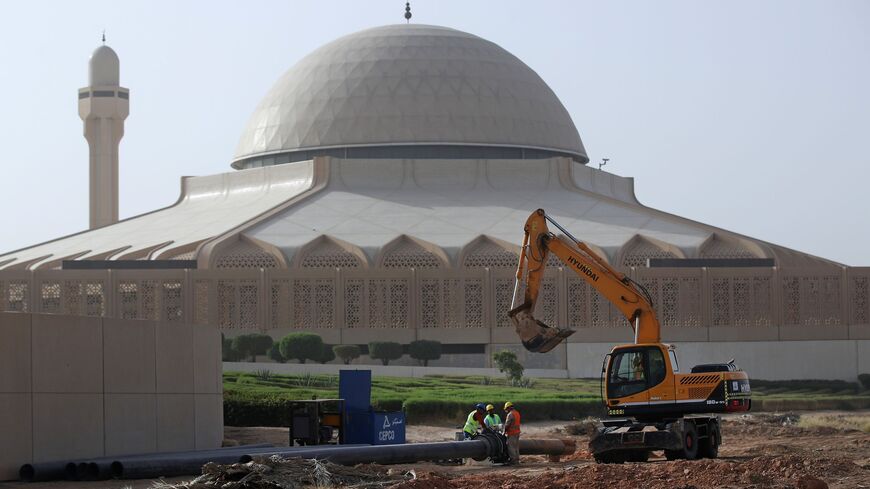In a bid to upgrade their economic ties, Saudi Arabia and Pakistan are mulling a long-term investment strategy. The kingdom is encouraging major Saudi companies to expand their business internationally and offering government help and resources through the National Companies Promotion Program (NCPP) if they are not currently active abroad.
Meeting on the sidelines of the Tashkent International Investment Forum last week, the chairman of Pakistan’s Board of Investment (BOI) and minister of state, Azfar Ahsan, and the Saudi Minister for Investment, Khalid Al-Falih, discussed options for promoting bilateral investment.
According to the official statement issued by Pakistan’s investment board, “It was agreed that shovel-ready projects, including the expansion project of Pakistan Refinery, will be evaluated by the Saudi government.”
In 2019, the kingdom had announced plans for a $10 billion oil refinery at Gwadar port, but logistics issues hampered the project. A 600-km oil pipeline connecting Gwadar to the main oil hub, Karachi, would be needed to make the Saudi investment worthwhile, and — according to the feasibility report prepared by Aramco — the transportation of processed oil from Gwadar would be too expensive even then.
This time, Saudi Aramco will be kicking off “preferred projects” in Pakistan’s oil refinery sector, and the expansion of a decades-old refinery in Karachi is most likely. Next, Saudi investors will receive some exceptional incentives in special economic zones in Pakistan. According to the BOI chairman, several proactive measures have been taken to facilitate investment.
“Saudi Arabia and Pakistan are historically close allies," Mohammed Alhamed, president of the Saudi Elite Group, told Al-Monitor, "and Riyadh’s investment comes to make Pakistan’s economic development stable and strong.”
Agriculture, mining, renewable energy, food processing, refineries, petrochemicals and information technology have been identified as potential areas of investment. Proposing a joint BOI-NCPP team for finalizing projects in Pakistan, Falih also suggested that the Pakistani side visit the kingdom and market investment projects both from the public and private sectors.
Alhamed said, “The Saudi investments in Pakistan today are an example of a power, security and economic partnership which will lead to shared prosperity, regional stability and mutual respect based on long term-investment, strategic and social ties.”
Despite a gradual increase to around $2.181 billion in 2020, low bilateral trade volume still remains a major shortcoming in Saudi-Pakistan relations. However, nearly 2.5 million Pakistani expats live in the kingdom, which is still Islamabad’s largest source of remittances.
Without strong bilateral economic connections, the Saudi-Pakistan relationship is incomplete. Even though it was once described as “probably one of the closest relationships between any two countries” by the former head of Saudi intelligence, Prince Turki bin Faisal, it has been affected by regional issues in recent years.
Pakistan adopted a neutral stance in the Yemen war and refused to send any troops in response to the kingdom’s request in 2015, as it was trying to balance Saudi Arabia and Iran.
Then in August 2019, India abrogated Article 370 and ended the special status of the disputed part of Kashmir valley in its control. As one of the three claimants in the Kashmir issue, Pakistan felt that the cause was not highlighted by the Saudi-led Organization of Islamic Cooperation (OIC), of which it is a founding member since 1969.
Next, in November 2019, Qatar, Turkey, Iran, Pakistan and Malaysia organized an Islamic summit in Kuala Lumpur without Saudi Arabia, which feared a rival bloc of Muslim countries outside the OIC, which it heads. Pakistan’s Prime Minister Imran Khan had planned to attend the event but backed out at the last minute due to Riyadh’s insistence.
However, some geopolitical re-alignments have also helped revive Saudi-Pakistan relations.
As Sebastian Sons, a researcher at the Center for Applied Research in Partnership with the Orient in Bonn, told Al-Monitor, “The current thaw in relations between Saudi Arabia and Pakistan is based on the general calculation of the kingdom to promote closer cooperation with regional partners amid rising tensions with the United States. Against this backdrop, Pakistan still serves as a key partner, traditional ally, and a potential security provider in times of regional stability.”
Ever since the Taliban government in Kabul took power, Riyadh has moved closer to Pakistan to gain some influence in Afghanistan. If there is any terror spillover from Afghanistan, the kingdom leans on Islamabad to remain relevant in Kabul without any active role.
Meanwhile, Islamabad’s trade and military ties have improved a great deal with Tehran in the last few years. Consequently, a stronger Saudi economic foothold in Pakistan might prevent it from moving closer to Iran.
Finally, Sons said, “Saudi Arabia has intensified its political, security and economic partnership with Pakistan’s main rival India, which has also widened the rift between Riyadh and Islamabad."
India has become Saudi Arabia’s fourth largest trading partner and the main source of its oil imports, with bilateral trade around $27 billion annually. Hence, Sons said, "Saudi Arabia needs to follow a balancing act in order to preserve close ties with both India and Pakistan. In this regard, the current investments need to be considered as part of the balancing efforts.”








